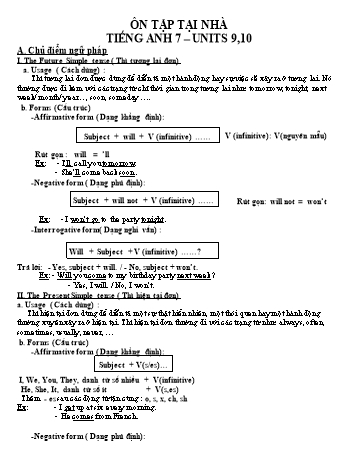Bài dạy môn Tiếng Anh Lớp 7 - Unit 9 +10
I. The Future Simple tense ( Thì tương lai đơn)
a. Usage ( Cách dùng) :
Thì tương lai đơn được dùng để diễn tả một hành động hay sự việc sẽ xảy ra ở tương lai. Nó thường được đi kèm với các trạng từ chỉ thời gian trong tương lai như: tomorrow, tonight, next week/ month/ year…, soon, someday ….
b. Forms (Cấu trúc)
-Affirmative form ( Dạng khẳng định):
| Subject + will + V (infinitive) …… |
V (infinitive): V(nguyên mẫu)
Rút gọn : will = ’ll
Ex: - I’ll call you tomorrow.
- She’ll come back soon.
-Negative form ( Dạng phủ định):
| Subject + will not + V (infinitive) …… |
Rút gọn: will not = won’t
Ex: - I won’t go to the party tonight.
-Interrogative form( Dạng nghi vấn) :
| Will + Subject + V (infinitive) ……? |
Trả lời: - Yes, subject + will. / - No, subject + won’t.
Ex: - Will you come to my birthday party next week ?
- Yes, I will. / No, I won’t.
II. The Present Simple tense ( Thì hiện tại đơn)
Tóm tắt nội dung tài liệu: Bài dạy môn Tiếng Anh Lớp 7 - Unit 9 +10

g) : Thì hiện tại đơn dùng để diễn tả một sự thật hiển nhiên, một thói quen hay một hành động thường xuyên xảy ra ở hiện tại. Thì hiện tại đơn thường đi với các trạng từ như: always, often, sometimes, usually, never, b. Forms (Cấu trúc) -Affirmative form ( Dạng khẳng định): Subject + V(s/es) I, We, You, They, danh từ số nhiều + V(infinitive) He, She, It, danh từ số ít + V(s,es) Thêm - es sau các động từ tận cùng : o, s, x, ch, sh Ex: - I get up at six every morning. He comes from French. -Negative form ( Dạng phủ định): Subject + do / does + not + V (infinitive) - do not = don’t - does not = doesn’t Ex: - Her house doesn’t have a yard. - They don’t have a friend. -Interrogative form( Dạng nghi vấn) : Do / Does + subject + V (infinitive) . ? Ex: - Do you want to go to the movies tonight? - Does she go to school by bike? Lưu ý: - Do : dùng làm trợ động từ cho các chủ ngữ I, We, You, They, danh từ số nhiều. - Does: dùng làm trợ động từ cho các chủ ngữ ...ore we go to bed. We can also use wooden toothpicks to clean between our teeth after a meal. Thirdly, we should eat food that is good for our teeth and our body: milk, cheese, fish, brown bread, potatoes, red rice, raw vegetables, and fresh fruit. Chocolate, sweets, biscuits and cakes are bad, especially when we eat them between meals. They are harmful because they stick to our teeth and cause decay. 0. Good teeth help us to ............ A. be nice B. have good eyesight PC. chew our food D. be important 1. When food and germs collect in a small crack, our teeth. A. become hard B. begin to decay C. send poison into the blood D. make us feel quite ill 2. A lot of people visit a dentist only when A. their teeth grow properly B. they have holes in their teeth C. they have toothache D. they have brushed their teeth 3. We ought to try to clean our teeth A. once a day B. at least twice a day C. between meals D. before breakfast 4. We shouldn’t eat a lot of A. red rice B. fresh fruit C. fish D. chocolate 5. Sweets are harmful because they make our teeth A. black B. ache C. bad D. cracked III. WRITING: Write the sentences, using the cues given: a. Mr. Toan / take / his children / the museum / last Sunday. . b. What / Hoa / her aunt / want / buy / supermarket / yesterday ? c. Lan / always get / early and / do morning exercises. We / see / a good film / TV / last night. e. Phuong and Mai / have / English test / next week. . 2. Put the words in the correct order to make meaningful sentences: a. dentist / had / Minh / a / went / yesterday / because / toothache. / to / the / bad / he b. Hue? / stay / Where / you / when / were / you / in /did c. Hoa / a / her / month. / received / from / last / mother / letter d. filled / cavity / in / dentist / week. / Nam’s / a / tooth / last / the . they / scared / children / come / the / see / feel / when / to / most / dentist. THE END GOODLUCK TO YOU
File đính kèm:
 bai_day_mon_tieng_anh_lop_7_unit_9_10.doc
bai_day_mon_tieng_anh_lop_7_unit_9_10.doc

